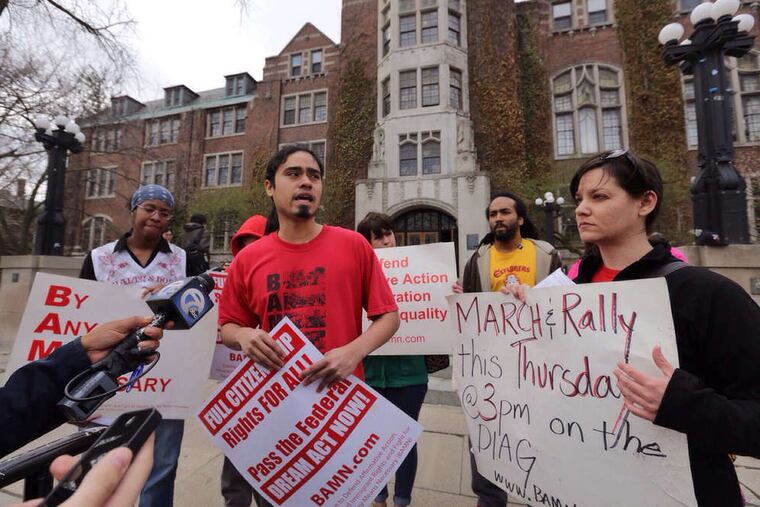High court: States can ban affirmative action
WASHINGTON - The Supreme Court on Tuesday made clear that states are free to prohibit the use of racial considerations in university admissions, upholding Michigan's constitutional amendment banning affirmative action.

WASHINGTON - The Supreme Court on Tuesday made clear that states are free to prohibit the use of racial considerations in university admissions, upholding Michigan's constitutional amendment banning affirmative action.
By a vote of 6-2, the court concluded that it was not up to judges to overturn the 2006 decision by Michigan voters to bar consideration of race when deciding who gets into the state's universities.
The ruling, which drew a sharp dissent from Justice Sonia Sotomayor, could encourage other states to join the handful that have such prohibitions, including California and Florida. Higher-education officials have warned that those states have seen a decline in the number of minorities admitted to their flagship universities.
In effect, the ruling says that universities may still employ the limited consideration of race authorized in previous Supreme Court rulings. But it also said that voters and legislators also have the right to curtail such plans.
That it took five separate opinions totaling 102 pages written over six months to reach that result is a sign of how divided the court remains on race-conscious government programs.
Justice Anthony M. Kennedy wrote the main opinion and said there was no reason for judicial intervention in state decisions that do not target minority groups.
"This case is not about how the debate about racial preferences should be resolved. It is about who may resolve it," Kennedy wrote in an opinion joined by Chief Justice John G. Roberts Jr. and Justice Samuel A. Alito Jr. "There is no authority in the Constitution of the United States or in this court's precedents for the judiciary to set aside Michigan laws that commit this policy determination to the voters."
Sotomayor, in the most powerful and notable dissent of her 41/2-year tenure on the court, blasted the majority and took particular aim at Roberts and the court's conservatives, who she said attempt to "wish away" evidence of the nation's racial inequality.
"Today's decision eviscerates an important strand of our equal protection jurisprudence," Sotomayor wrote in her 58-page dissenting opinion, joined by Justice Ruth Bader Ginsburg. Sotomayor, who this year said she was not fond of justices reading dissents from the bench to emphasize disagreement, overcame her reluctance to do just that.
"For members of historically marginalized groups, which rely on the federal courts to protect their constitutional rights, the decision can hardly bolster hope for a vision of democracy that preserves for all the right to participate meaningfully and equally in self-government," Sotomayor wrote.
Justices Antonin Scalia and Clarence Thomas, who oppose racial preferences, agreed with the outcome but not Kennedy's rationale.
Justice Stephen G. Breyer, normally part of the liberal bloc, also ruled for Michigan but on different grounds. If voters or their representatives have the right to adopt race-conscious policies, he said, so must they have the right to decide not to.
Justice Elena Kagan recused herself from the case, Schuette v. Coalition to Defend Affirmative Action, presumably because she had worked on it while solicitor general.
While other courts had upheld affirmative-action bans, the U.S. Court of Appeals for the Sixth Circuit narrowly disapproved of Michigan's constitutional amendment, which was approved by 58 percent of the state's voters.
Relying on Supreme Court decisions from the 1960s and early 1980s, the appeals court majority said the amendment restructured the political process to make it harder for minorities to press their concerns.
Kennedy said the appeals court had read those decisions too broadly. The policies struck down in the court's previous cases were government actions that "had the serious risk, if not purpose, of causing specific injuries on account of race."
Sotomayor countered that there may not be a single statewide initiative in any state in which voters approve policies that favor minority groups.
"As members of the judiciary tasked with intervening to carry out the guarantee of equal protection," she wrote, "we ought not sit back and wish away, rather than confront, the racial inequality that exists in our society."
Roberts responded with a sharp statement of his own. "To disagree with the dissent's views on the costs and benefits of racial preferences is not to 'wish away, rather than confront' racial inequality," he wrote.
"People can disagree in good faith on this issue, but it similarly does more harm than good to question the openness and candor of those on either side of the debate."
Michigan Attorney General Bill Schuette praised the decision. "A majority of Michigan voters embraced the ideal of equal treatment in 2006, and today their decision was affirmed," he said.
It is unclear how the decision might move other states. Eight already ban racial considerations. And even some conservative states - Texas, for instance - have been adamant that they be allowed to consider race to achieve diverse student bodies.
But the court's decision could encourage opponents of affirmative action to press for movement, using the decision as an impetus.
"The Supreme Court has given voters the green light to eliminate the use of racial preferences in college admissions, which is discouraging for racial diversity," said Richard Kahlenberg, a scholar at the Century Foundation who has advocated for economic diversity in admission decisions. "The good news, however, is that there are alternative ways to achieve diversity that can also deal with economic inequalities."